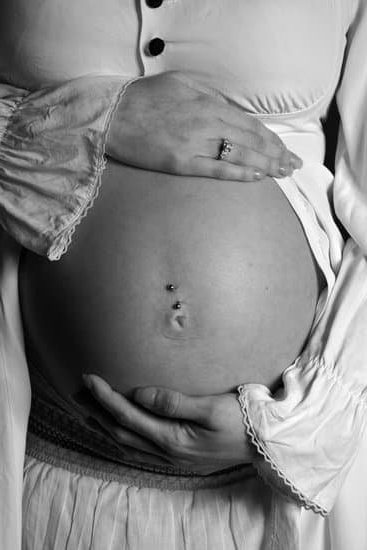Experiencing a range of symptoms and changes is normal during early pregnancy. One common concern that many expectant mothers may have is whether bleeding is normal at this stage. Understanding what to expect can help alleviate worries and ensure a healthier journey for both mom and baby.
Bleeding in early pregnancy can be a cause of anxiety for many women, but it’s important to know that it can sometimes be a normal occurrence. As the body undergoes various hormonal changes and adjustments to accommodate the growing fetus, some light spotting or bleeding may occur. However, it is crucial to differentiate between what is considered normal and what may require medical attention.
Knowing the causes of bleeding in early pregnancy, as well as the different types of bleeding that may occur, can help expectant mothers navigate this delicate period with more confidence. By being informed about when to be concerned about bleeding, understanding common misconceptions surrounding this issue, and learning expert advice from medical professionals, women can empower themselves with knowledge and peace of mind throughout their pregnancy journey.
Causes of Bleeding in Early Pregnancy
Understanding the Causes of Bleeding in Early Pregnancy
Bleeding in early pregnancy can be a source of anxiety and confusion for many expectant mothers. However, it is important to understand that there are various reasons why bleeding may occur during the first trimester. One common cause is implantation bleeding, which occurs when the fertilized egg attaches to the uterine lining. This typically occurs around the time of your expected period and is usually light and short-lived.
Another possible cause of bleeding in early pregnancy is cervical changes. As your body prepares for pregnancy, the cervix becomes more sensitive and may easily bleed during intercourse or a Pap smear. In some cases, cervical polyps or infections can also lead to bleeding. Additionally, hormonal changes during pregnancy can affect the blood vessels in the cervix, making them more prone to bleeding.
Other Potential Causes of Bleeding
In certain instances, bleeding in early pregnancy could be a sign of something more serious, such as a miscarriage or an ectopic pregnancy. Miscarriage is sadly not uncommon in early pregnancy and can present with symptoms like heavy bleeding, cramping, and tissue passing from the vagina. An ectopic pregnancy occurs when the fertilized egg implants outside the uterus, usually in one of the fallopian tubes, leading to potentially life-threatening complications if not addressed promptly.
Subchorionic hemorrhage (bleeding between the chorion and uterine wall) can also cause vaginal bleeding in early pregnancy. This condition may resolve on its own but should still be monitored by healthcare professionals to ensure it does not pose any risks to you or your baby.
Screening for conditions like gestational trophoblastic disease or molar pregnancies is also essential if persistent or abnormal bleeding is bleeding normal in early pregnancy. Remember that while some causes of bleeding may be benign, it is always crucial to consult with your healthcare provider if you experience any vaginal bleeding during pregnancy.
Types of Bleeding in Early Pregnancy
Implantation Bleeding
One type of bleeding that can occur in early pregnancy is implantation bleeding. This typically happens around the time when a fertilized egg attaches to the lining of the uterus, which usually takes place about 6-12 days after conception. Implantation bleeding is typically light and may appear as light spotting. It differs from a regular menstrual period in terms of color and flow, often being lighter in color and flow.
Threatened Miscarriage
Another type of bleeding that can be seen in early pregnancy is known as threatened miscarriage. This occurs when there is some bleeding, but the cervix remains closed, indicating that the pregnancy may still continue. However, it’s essential to seek medical attention if experiencing this type of bleeding to ensure the well-being of both the mother and the baby. Symptoms may include mild to severe cramping along with bleeding.
Ectopic Pregnancy
In some cases, bleeding in early pregnancy could be a sign of an ectopic pregnancy, where the fertilized egg implants outside the uterus, typically in the fallopian tube. Ectopic pregnancies are considered medical emergencies and require immediate intervention. Along with vaginal bleeding, women with an ectopic pregnancy may experience sharp abdominal pain, dizziness, or lightheadedness due to internal bleeding. If these symptoms occur, it is crucial to seek medical help promptly.
When to Be Concerned About Bleeding in Early Pregnancy
Bleeding during early pregnancy can be a source of concern for many expectant mothers. While some spotting or light bleeding is common and often harmless, it is essential to know when to be concerned about bleeding in early pregnancy. Understanding the signs that warrant medical attention can help ease anxiety and ensure the health and safety of both the mother and baby.
To help determine when bleeding in early pregnancy may be a cause for concern, here are some key factors to consider:
- Amount of Blood: Light spotting or minimal discharge may not necessarily be alarming, but heavy bleeding that requires changing pads frequently should be reviewed by a healthcare provider.
- Pain: Cramping and abdominal pain accompanying bleeding could indicate potential complications such as ectopic pregnancy or miscarriage.
- Duration: Prolonged or persistent bleeding, especially if it becomes heavier over time, could signal underlying issues that need attention.
While every woman’s experience with bleeding in early pregnancy varies, it is vital to trust your instincts and seek medical advice if you are concerned about any abnormal signs. Remember that prompt evaluation from a healthcare provider can provide reassurance and appropriate care, ensuring the best possible outcome for you and your baby.
Common Misconceptions About Bleeding in Early Pregnancy
One common misconception about bleeding in early pregnancy is that any amount of bleeding is a cause for alarm. In reality, light spotting can be normal during the first trimester. This light bleeding, often referred to as implantation bleeding, occurs when the fertilized egg attaches to the lining of the uterus.
It is usually lighter in flow and shorter in duration compared to a regular menstrual period. However, if the bleeding is heavy or accompanied by severe cramping, it is important to seek medical attention.
Another misconception is that all types of bleeding in early pregnancy result in miscarriage. While it is true that bleeding can sometimes indicate a potential issue with the pregnancy, not all cases end in loss. There are various causes of bleeding during early pregnancy, including implantation bleeding, hormonal changes, infections, and even cervical irritation. It is essential not to jump to conclusions and instead consult with a healthcare provider to determine the underlying cause.
Some individuals may mistakenly believe that bed rest is necessary if experiencing any amount of bleeding during early pregnancy. While it is important to take precautions and avoid strenuous activity if you are experiencing bleeding, bed rest may not always be recommended by healthcare professionals. Depending on the cause of the bleeding, moderate activity may be safe and even beneficial for both the mother and baby. It is crucial to follow medical advice and guidelines tailored to your specific situation.
| Common Misconception | Explanation |
|---|---|
| Any amount of bleeding is alarming | Light spotting can be normal during implantation |
| Bleeding always leads to miscarriage | Various causes of bleeding exist and not all result in loss |
| Bed rest is necessary for all types of bleeding | Bed rest may not always be recommended; follow medical advice |
How to Differentiate Between Normal and Abnormal Bleeding
Bleeding during early pregnancy can be a source of concern for expectant mothers, but it is important to understand that some bleeding is actually normal in the first trimester. This occurrence is known as implantation bleeding, which typically occurs around the time of your expected period and may be lighter and shorter than a normal menstrual period.
It is usually not accompanied by cramping or severe pain. Understanding this distinction is crucial in order to differentiate between normal and abnormal bleeding during early pregnancy.
On the other hand, abnormal bleeding during early pregnancy may be caused by various factors such as ectopic pregnancy, miscarriage, or other complications. It is essential to monitor the amount and frequency of bleeding, as well as any associated symptoms like severe abdominal pain or dizziness. If you experience heavy bleeding similar to a menstrual period, passing clots, or severe abdominal pain, it is recommended to seek immediate medical attention as these could indicate a more serious issue.
To help distinguish between normal and abnormal bleeding in early pregnancy, keeping track of your symptoms and being aware of your body’s changes can provide valuable insight. Consult with your healthcare provider if you have any concerns about the type of bleeding you are experiencing. Remember that every pregnancy is unique, so it is always better to err on the side of caution when it comes to your health and the health of your baby.
| Factors | Normal Bleeding | Abnormal Bleeding |
|---|---|---|
| Amount | Lighter and shorter than a normal menstrual period | Heavy bleeding similar to a menstrual period |
| Symptoms | No cramping or severe pain | Severe abdominal pain or dizziness |
| Action Needed | Monitor closely but no immediate concern | Seek immediate medical attention |
Steps to Take if Experiencing Bleeding in Early Pregnancy
Experiencing bleeding in early pregnancy can be a concerning and frightening experience for expectant mothers. It is essential to take certain steps to ensure the health and well-being of both the mother and the developing fetus. Here are some important actions to consider if you find yourself facing this situation:
- Stay Calm: The first and most crucial step is to stay calm. While it can be alarming, not all bleeding in early pregnancy signifies a serious issue. Take deep breaths and try to remain composed.
- Contact Your Healthcare Provider: It is vital to contact your healthcare provider immediately if you experience any bleeding during early pregnancy. They will be able to provide guidance on the next steps to take based on your specific situation.
- Monitor Symptoms: Pay close attention to any accompanying symptoms, such as cramping or back pain, and make note of the color and amount of blood. This information can be valuable for your healthcare provider in determining the potential cause of the bleeding.
Remember that seeking medical advice is always recommended when experiencing bleeding in early pregnancy. Your healthcare provider will assess your individual circumstances and provide appropriate guidance for your specific situation.
Expert Advice
During early pregnancy, it is not uncommon for women to experience some degree of bleeding. This can be a source of concern for many expectant mothers, but it is essential to understand that some bleeding is considered normal in the early stages of pregnancy.
In fact, about 20-30% of women may experience light bleeding or spotting during the first trimester. This is often referred to as implantation bleeding and occurs when the fertilized egg attaches itself to the uterine lining.
Medical professionals stress the importance of distinguishing between normal and abnormal bleeding in early pregnancy. Normal bleeding typically presents as light spotting that may be pink or brown in color and lasts for a short period of time. However, if the bleeding is accompanied by severe abdominal pain, cramping, heavy flow resembling a menstrual period, or tissue passing from the vagina, it could indicate a potential complication and should be promptly evaluated by a healthcare provider.
It is crucial for expectant mothers to stay informed about common signs and symptoms during early pregnancy, including different types of bleeding. While some amount of light spotting is generally considered normal, it is essential to monitor any changes in frequency, duration, or intensity of bleeding.
Additionally, seeking medical advice promptly can help alleviate concerns and ensure proper management if any issues arise. Remember that every pregnancy is unique, so it is always best to consult with your healthcare provider for personalized guidance and reassurance throughout this special journey.
Conclusion
Bleeding in early pregnancy can often be a source of anxiety and concern for expectant mothers. However, it is important to understand that some amount of bleeding is actually normal during this time. This can be attributed to factors like implantation bleeding, hormonal changes, or cervical irritation. It is crucial for women to differentiate between what is considered normal bleeding and when they should seek medical attention.
By educating themselves on the causes and types of bleeding in early pregnancy, expectant mothers can feel more empowered and confident in navigating this stage of their journey. Being aware of the common misconceptions surrounding bleeding in early pregnancy can also help alleviate unnecessary worry. Expert advice from healthcare professionals stresses the importance of monitoring the intensity and frequency of bleeding, as well as accompanying symptoms, to determine whether further evaluation is needed.
Ultimately, the goal is to provide expectant mothers with the knowledge and peace of mind they need during this delicate phase. By understanding when to be concerned about bleeding in early pregnancy and knowing the steps to take if it occurs, women can approach this time with greater confidence and assurance.
Remember, every pregnancy is unique, so it is always best to consult with a healthcare provider if there are any concerns or uncertainties regarding bleeding. Stay informed, stay vigilant, and trust your instincts to ensure a healthy and safe pregnancy journey.
Frequently Asked Questions
What Color Is Miscarriage Blood?
Miscarriage blood can vary in color from bright red to dark brown, depending on various factors. Bright red blood may indicate fresh bleeding, while dark brown blood may suggest old blood from the uterus.
What Should Early Pregnancy Bleeding Look Like?
Early pregnancy bleeding should generally be light and minimal. It may appear as light spotting or pinkish discharge. Heavy bleeding with severe cramping could be a sign of concern and should be evaluated by a healthcare provider.
Is Spotting at 5 Weeks Pregnant Normal?
Spotting at 5 weeks pregnant can be normal for some women. It could be due to implantation bleeding or hormonal changes causing slight spotting. However, if the spotting is heavy or accompanied by pain, it’s important to seek medical advice promptly.

Welcome to my fertility blog. This is a space where I will be sharing my experiences as I navigate through the world of fertility treatments, as well as provide information and resources about fertility and pregnancy.





